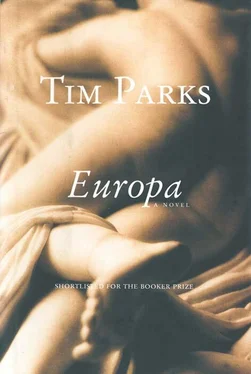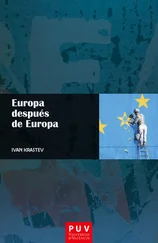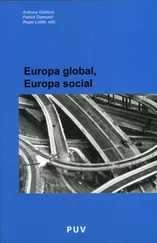Tim Parks - Europa
Здесь есть возможность читать онлайн «Tim Parks - Europa» весь текст электронной книги совершенно бесплатно (целиком полную версию без сокращений). В некоторых случаях можно слушать аудио, скачать через торрент в формате fb2 и присутствует краткое содержание. Год выпуска: 1999, Издательство: Arcade Publishing, Жанр: Современная проза, на английском языке. Описание произведения, (предисловие) а так же отзывы посетителей доступны на портале библиотеки ЛибКат.
- Название:Europa
- Автор:
- Издательство:Arcade Publishing
- Жанр:
- Год:1999
- ISBN:нет данных
- Рейтинг книги:3 / 5. Голосов: 1
-
Избранное:Добавить в избранное
- Отзывы:
-
Ваша оценка:
- 60
- 1
- 2
- 3
- 4
- 5
Europa: краткое содержание, описание и аннотация
Предлагаем к чтению аннотацию, описание, краткое содержание или предисловие (зависит от того, что написал сам автор книги «Europa»). Если вы не нашли необходимую информацию о книге — напишите в комментариях, мы постараемся отыскать её.
Europa — читать онлайн бесплатно полную книгу (весь текст) целиком
Ниже представлен текст книги, разбитый по страницам. Система сохранения места последней прочитанной страницы, позволяет с удобством читать онлайн бесплатно книгу «Europa», без необходимости каждый раз заново искать на чём Вы остановились. Поставьте закладку, и сможете в любой момент перейти на страницу, на которой закончили чтение.
Интервал:
Закладка:
The effect of my raising my voice was that the Avvocato Malerba now felt obliged to object — though he did so with a commendable mixture of politeness and jocularity — that this was a very cynical, typically Anglo-Saxon, and above all un-European way of viewing the world. There were clearly, he said, picking up what had now become, with his offering to pay, our collective tray, those in Europe, visionaries, who thought chiefly of the common good — Jacques Delors and Prime Minister Gonzalez, to name but two, and likewise the Dutch Prime Minister, was it Maartens, who …
But before he could finish speaking and with a quite ludicrous and shameful sense of triumph, as though of a child crushing an insect, or a Rottweiler snapping at some innocent hand that wishes to feed it, I began shouting that far from being Anglo-Saxon my views had been most eloquently expressed by Niccoló Macchiavelli and before that, and even more eloquently perhaps, by the ancient Greeks, whose culture surely lay at the heart of European identity and whose alliance of city states had quite probably been the first example of a European joint venture, though one established primarily of course against an outside enemy, not in the name of any fine principles, and always fraught by internal power games, of the kind, I insisted (aware now as we moved across the fluorescent-lit space that she must be no more than an arm’s length away on my right), of the kind that had led the great Thucydides to say, and I quoted, speaking far louder than I needed: We believe, out of tradition so far as the gods are concerned’, and from experience when it comes to men, that as a dictate of nature every being always exercises all the power he has at his disposal
There was a brief silence.
The Bundesbank included, I added.
Shall we sit here? Nicoletta asked. I owe you five thousand three hundred lire. Oh forget it, the Avvocato Malerba said. No, please. But I insist. Grazie , Nicoletta said, blushing, it’s very kind of you. At which the Avvocato Malerba looked up and, smiling at me from his somehow dusty but boyish cheeks, said, Just take it as a demonstration that not everybody is obsessed by the exercise of personal power, a statement which, on the contrary, I could have shown, only demonstrated the truth of what I had said, in that it served most perfectly to make him look gracious and myself foolish, and all the more so when, on turning round, I realized that she would not have heard at all. She had crossed the whole cafeteria since I last saw her and was now leaning over Georg, deep in confabulation.
CHAPTER FIVE
Robin Williams has just read Carpe Diem to his Dead Poets Society. How everything leads back. Does he have daughters? Lear asked, of anybody remotely unhappy And even this unexpected analogy, Lear, Cordelia, leads me back through my own daughter’s fantasticated lesbianism to her . She is the centre, of the world and this trip a vortex, the mind channelled, like the chase of traffic through this interminable tunnel beneath the Alps, in that one direction, her slender video-lit neck just a few paces further forward, but ever distant despite the headlong flight of this coach, these thoughts, never to be touched again, or licked, or when your nail trailed the knuckles of her spine. Everything is past, I tell myself, and yet because of that more present than ever. As if the only paradise one might ever set out to explore were paradise lost.
And it is this, sitting here on the third seat from the back in this luxury coach racing on a slight downward slope beneath incalculable tons of rock through one of those engineering feats which have given us the miracle, so called, of rapid communications, it is this that I cannot understand: how presently omnivorous that past is, how Robin Williams quoting Horace in an Alpine tunnel immediately recalls Robin Williams speaking a demotic DJ Italian in Buon Giorno Vietnam when my wife was away at the sea with Suzanne and she on the red couch at home in only a silk nightdress admiring the dubbing, saying how clever it was to have matched such rapid speaking and punning, how clever dubbing was in general, putting words in people’s mouths, annihilating differences, annihilating barriers — she would love, she said, to get a job in dubbing — and I can smell the sweet perfume in her hair fallen slantwise as she absently preens, I can sense the neatness of her posture sitting cross-legged, telling me in French that this Italian dubbing of American English was so good. And for all my adoration, I tell myself now, for all her complacency, the barriers between ourselves were such, though I didn’t know it then, as no polyglot facility or engineering prowess could ever resolve. The words, as now on the screen, were one thing, but the gestures came from quite another language: two cultures indifferently superimposed for the convenience of apparent comprehension, the luxury of immediate entertainment.
Cars overtake in the tunnel. There are red lights and glare. To the right, yellow neon every so many metres spangles on the curved plastic of our modern coach window, flashes chemically over the deep red upholstery, altering the colours on the screen, as if through fading and intensifying filters. And watching Doris Rohr (who always votes against strike action, who openly says she would be willing to accept less money so long as she can keep her job, her precious job, she whose husband is a surgeon, she who has to decide which of her holiday homes to spend the long summer break in), watching this German woman pensively unwrapping another of her expensive chocolates in the insistent on-off of a dark under-ground brightness, her fingertips plucking unseeing at coloured foil, her eyes happily fascinated by Robin Williams and by the sort of contemporary pieties these films purvey and that we all identify with in opposition to a status quo which miraculously no cinema-goer is ever part of, yes, watching solid, square-mouthed, brick-lipsticked Doris, it occurs to me, sitting on the third seat from the back of this coach full of, to use a Colinism, shaggable young women, it occurs to me I was saying, what an incredibly foolish philosophy the expression carpe diem enshrines .
Carpe diem , yes, yes, seize the day, seize it, now, and now, and now, then to be marooned there in those few precious hours, days, months, whatever, it doesn’t matter, of love, of passion, marooned for all the waste sad time that must stretch after, not shovelling shit against the tide as my wife, would to keep the corpses at least enburied, our grave-clothes decent if nothing else, her impossible struggle to ripristinare , nor gracefully chasing about the mythical urn in the bliss of the moment anticipated — those routine or romantic relationships with intensity, with beauty — no, but waltzing, as I am waltzing, with the living dead, the memory trapped in the groove of an endlessly repeated pirouette pushed to the furthest extremes of vertigo, she and I here, she and I there and then (when the day was so fatally seized), she and I as we might have been, today now, side by side on this seat, in this coach at this moment, her head against my shoulder, now now and still now. Which is the worst waltz of all.
I hate myself for quoting Thucydides, for shouting at the Avvocato Malerba in the Chambersee Service Station. I hate myself for having come on this trip. My idea, when Vikram Griffiths placed his clipboard beneath my nose in the miserable and amorphous institutional space of the foreign lectors’ tutorial room — my idea, or rather the idea that so seductively presented itself, was that of showing myself in public again, no, showing myself to her again, of demonstrating that I wasn’t the least bit troubled by the sight of her or even by the sight of her confabulating together with Georg. I would show her, and myself — this must have been my idea — that these things did not touch me any more, because she had not after all, I told myself, had such a determining effect on my life. Quite the contrary. She had merely been the catalyst I needed to make a change in my life, merely the particular day I had chosen, at the last, to seize: Tuesday, though it might perfectly well have been Wednesday; her though it could equally have been Psycho-tottie or Bologna-tottie or Opera-tottie. Yes, I would come on this trip and be urbane and relaxed. That’s what I imagined. I would watch lights flash on and off in deep Alpine tunnels and the effect would not become an image of my obsession, pulsing, lurid, unflattering. For I had left obsession behind, I told myself, when I moved into Porta Ticinese number 45, when I changed my whole music collection, when I bought a new wallet, a new briefcase, a new coat.
Читать дальшеИнтервал:
Закладка:
Похожие книги на «Europa»
Представляем Вашему вниманию похожие книги на «Europa» списком для выбора. Мы отобрали схожую по названию и смыслу литературу в надежде предоставить читателям больше вариантов отыскать новые, интересные, ещё непрочитанные произведения.
Обсуждение, отзывы о книге «Europa» и просто собственные мнения читателей. Оставьте ваши комментарии, напишите, что Вы думаете о произведении, его смысле или главных героях. Укажите что конкретно понравилось, а что нет, и почему Вы так считаете.












